For the first time in history, the coronation of a British monarch will feature a significant role for non-Christian faiths and the country’s Celtic languages. On May 6th, King Charles III will be crowned at Westminster Abbey in a ceremony that draws heavily from Christian liturgy but also includes contributions from leaders representing Muslim, Hindu, Sikh, Buddhist, and Jewish communities.
The order of service, released by the office of Archbishop of Canterbury Justin Welby, includes a greeting from leaders of these faiths at the end of the coronation in which they acknowledge the value of public service and express gratitude for the opportunity to serve alongside the king. Members of the House of Lords from non-Christian faiths will present non-Christian regalia to the king, such as gold bracelets and the royal robe.
The coronation will also include readings and blessings from leaders of several Christian denominations, including Catholic, Greek Orthodox, and Scottish Free Church. In a significant departure from tradition, King Charles III will pray aloud during the service, asking God to “be a blessing to all thy children, of every faith and conviction.”
Beyond the inclusion of non-Christian faiths, the coronation will also feature a tribute to King Charles III’s late father, Prince Philip, through the performance of a Greek choir. A Gospel choir will also perform.
Another unique aspect of the coronation is the inclusion of the UK’s Celtic languages: Welsh, Scottish Gaelic, and Irish Gaelic. A prayer will be sung in Welsh during the ceremony, and verses of a hymn will be sung in all three minority languages after the archbishop’s sermon.
While the coronation is primarily an act of Christian worship, Archbishop Welby noted that the inclusion of non-Christian faiths and minority languages reflects the diversity of contemporary British society. The ceremony serves as a celebration of tradition and customs while also recognizing the importance of protecting the diversity of the country and its faiths.
King Charles III, a committed Christian, has expressed his interest in defending all faiths, not just Anglicanism, in the increasingly multicultural society of the UK. His coronation will mark a historic moment of inclusion and recognition for the many different faiths and languages that make up the fabric of British society.




